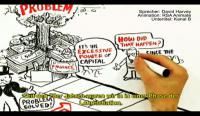Greece is being driven into a humanitarian crisis by the International Monetary Fund, the European Central Bank and the EU commission, says Aris Chatzistefanou, director of the documentary "Debtocracy". The social achievements of the 20th century are being destroyed in Greece. For the first time since WW II, there is massive malnutrition of children. However, Greek citizens are not those to blame for the crisis, but a destructive financial system and a faulty design of the eurozone which drives some countries into overindebtment and brings excessive surplus to others - as in the case of Germany. The rescue packages have mainly served to bail out the banks again, not the citizens. Only if the citizens strive for real democracy as they have started in the Arab Spring and in the Occupy movements, real change is going to happen.
Aris Chatzistefanou, filmmaker from Athens, director of the documentary "Debtocracy" which has been viewed by more than 1.5 million people worldwide
Kontext TV: Welcome to Kontext TV, Aris Chatzistefanou.
Aris Chatzistefanou: Thank you for having me.
Kontext TV: What is the title of your film, what is it about and what was the resonance in Greece and abroad?
Aris Chatzistefanou: Our documentary is called “Debtocracy”. It’s playing with the words debt and democracy. Because we believe, that the debt crisis in Greece and in the European periphery as a whole is not only about economics but also about democracy. It is a political struggle at the core of it. We wanted to explain to ourselves and to the Greek audience that what the Greek government, the ECB or even the government in Germany are saying - that we are not working enough, that it’s all our fault, that we have spent more money than we could possibly earn in our lifetime - is simply not true. There is first of all a structural crisis of the financial system as a whole. That started not in 2007/2008, but in the late 60s and early 70s. After that, they managed to find a solution for some decades with neoliberalism by attacking the working people. For several years the financial system was kept alive but after 2007/2008 we saw that it was no longer viable, because it was unable to maintain the growth levels that it needed in order to survive. After the structural problems of the world financial system, we wanted to talk about the structural problems of the Euro zone because this system has a core problem: it creates deficits and debt at the European periphery while at the same time creating surpluses in countries like Germany and France. So, even if everything was working perfectly in Greece, which is not the case - we know there are tremendous problems in the Greek economy - but even if everything was working perfectly, this system would create deficits and debt. That is why many people have even started talking about the possibility of exiting the Euro zone, although it used to be a taboo subject for the last decade. We know this is not easy and will create many problems, but at the moment it is on the table and is being discussed. We wanted to explain the structural problems in the world financial system, in the Euro zone and in the Greek economy, of course. These created the debt and the people are not to blame for the situation.
Kontext TV: What are the effects of the crisis on the Greek population, especially in terms of employment, health, education and other public services?
Aris Chatzistefanou: What the Greek government is doing a t the moment by obeying the orders it takes from the ECB and the IMF can be characterized as a social genocide. For the first time after WWII there is a generation of small children, who don’t have enough food, which was unimaginable some months, some years, or some decades ago. The social structure in Greece is undergoing a total destruction. Unemployment is at 16% and we are sure it will reach 20% and more in the next few months. People have lost the labour rights they have gained in the 20th century. What the government is imposing on the Greek working people is the labour law of the 19th century. We are losing whatever was gained since.
The best example to understand how difficult things are in Athens' centre is "Doctors of the World", an organisation that used to work in sub-Saharan Africa, in countries like Uganda or Ethiopia. Now they are in the centre of Athens and their president told me they are facing a humanitarian crisis there. It is the same situation as everywhere the IMF goes.
Kontext TV: Interestingly, the IMF was also at the centre of structural adjustment in the 3rd world since the 80s. Is the same happening in Greece, now?
Aris Chatzistefanou: Some say the IMF has changed, but that’s not true. They are doing exactly what they were doing in Latin America, in Africa or in poor Asian countries. They are destroying the social structure and everything else in order to minimise wages and privatise everything. That will be the subject of our next documentary. Because we have seen what happened in countries like Argentina or Ecuador when the IMF intervened, trying to sell all the public property and privatise it. That is happening right now in Greece and it’s funny that they have sent the same people. People like Bob Traa who was responsible for the IMF in Ecuador and who tried to privatise the electricity company. He is working in Athens now, in a European country, doing exactly the same thing as in what we call third world countries.
Kontext TV: And there was also a proposal to create an institution modelled after the German Treuhand. Talk about this parallel.
Aris Chatzistefanou: This was Mr. Juncker’s idea. He said we have to privatise everything. What Treuhand did by taking East German public property and selling it would be the best example for us. Of course you just have to read some newspapers to see what happened in Germany with Treuhand, with all the scandals and the millions of people who lost their jobs. So we know now, that this is not an example to follow, even though the situation is not exactly the same because Greece is not like East Germany. The economy is completely different. But we have seen the Treuhand fail and we are not going to let this happen again.
Kontext TV: You already mentioned that very often the Greek people's laziness is presented as the root cause. What are the real causes of the high debt and the crisis in Greece, in your view?
Aris Chatzistefanou: As I said, the world financial crisis and the Euro zone are the most important causes. But we can also talk about structural problems in the Greek economy. The main problem is the tax system. Greece is a tax heaven for the rich and a tax hell for everyone else. Just imagine that the church as the biggest landowner in Greece doesn’t pay a single Euro in taxes. Greek ship owners who operate the second biggest merchant fleet in the world paid only 12 million Euros in taxes last year, while at the same time the illegal immigrants who wanted to obtain the permission to stay in Greece paid 50 million - more than five times as much.
Another major problem is defence spending. Countries like the US, France, Russia or Germany are eager to sell their weapons to the Greek government and the Greek ministers are always willing to buy because they are getting various rewards. By consequence, Greece has the fifth highest defence budget in the world in proportion to its GDP. It is like being at war for decades, although the weapons are just sitting there. There are of course many others problems like corruption, but I wouldn't name corruption as the biggest one. We always point to the structural problems, because even with our increased tax revenue and even if we get rid of all corrupt politicians we will have reach the same debt levels again in a few years. We believe that the Euro and the Euro zone are at the centre of this problem and create the deficits and the debts.
Kontext TV: How do you see the role of the Troika, the European commission, the ECB and especially the German government in this crisis?
Aris Chatzistefanou: Some people call what is happening right now in Greece an economic occupation and I think they are right. There are people from the EU or from other governments who are not elected in any way inside the Greek ministries and taking decisions for the future of the Greek people. Even if we were the worst people in the world and you had to put us all in jail, you could not just ignore the democratic structure of a country, invade it politically and financially and impose your will. All the members of the Troika knew that the Greek debt is impossible to repay. A small country like Greece cannot repay a debt of 350 to 360 billion Euros. It is impossible and they knew it from the beginning but the wanted to protect the banks and foreign lenders. They wanted to give them time so that they could get rid of the Greek bonds, send them back to the ECB and in a way to the European tax payers. That’s what they have been doing during the last year. They are not protecting the Euro or Greece - they are just protecting foreign banks and the governments who support these banks. That is how the Greek people started thinking. The first year, they were persuaded they had done something terribly wrong to get in this situation. Now they understand that it's not so simple. There are many other factors that have played a crucial role in creating this crisis.
Kontext TV: What alternatives could there be to current crisis policies?
Aris Chatzistefanou: First of all we have to explain that there will be no easy solution to this problem. The Greek population will pay for what happened in a very hard way. I suggest that Greece should default on its debts, because it is not only impossible to repay this debt, but much of it is illegal or odious, so the Greek population is not responsible for it. Therefore the first step would be to default. If Greece defaults, there is no use in its staying in the Euro zone. The Euro zone has nothing more to offer it. Exiting the Euro zone would give it the ability to devaluate its currency and start its industry and its economy from scratch. We understand that this is difficult, but if you believe, as we do, that the Euro zone is responsible for the crisis, such a decision has to be taken. Of course, if Greek defaults and decides to exit the Euro zone, the banking sector will collapse, that is for sure. So the third step would be to nationalise the banks, which might sound revolutionary or ultra-socialist but even mainstream politicians would agree, because it is the only way to save the banking sector.
Kontext TV: Accordingly, there are three steps: Default, exit the Euro zone and nationalise the banking sector.
Aris Chatzistefanou: In any case, it all depends on who will make the decision, who will take the initiative. Because if you let the EU, the ECB, or the IMF make the decision, it will mean a disaster for Greece. The Greek population will have to put pressure on its government to take these three steps, and that could alter the balance of capital and labour, which is the main cause. We are not ready for a revolution that we all might want to see in our lifetime, we aren't there yet. But we have to change this balance between capital and labour and we can do it if the population takes the initiative.
Kontext TV: If Greek exits the Euro zone, wouldn’t that be dangerous for the European integration process, which has been underway since WWII?
Aris Chatzistefanou: Certainly but what is this European integration? Is it real political and social integration or just a way to support financial institutions in their daily exchange? The Euro was actually an instrument for the banking sector and the stock exchanges to work better. We don’t have an international communion of European people, which we want. We want all Europeans to come together in a single nation if it is possible, but not with this European Union. This Union is just a tool for some financial institutions and not for the people of Europe.
Kontext TV: Do you think that the Greek movements are able to put forward alternatives? Today there was a strike in Greece. Tell us about what is happening in Greece, what the movement is aiming for and how it is linked to other movements in Spain, in the US (“Occupy Wall Street”) or North Africa.
Aris Chatzistefanou: The problem in Greece right now is that there is no political movement or party to take the initiative and make specific suggestions about the crisis and the way out of it. The people are there, they will demonstrate and we believe there will be riots, simply because people don’t have enough food for their children. The question is: What will happen afterwards? In Argentina, we had the same situation: There were people on the street but no specific political movement to provide political guidance. What happened? At first, they won. The Kirchner government was obliged to say no to the IMF, to say we will default and we won't give you all the money you're asking for. But after some years they came back to the same situation, because there was now a political movement that said something different to the people and gave them a political dream they could follow. The difficulty in Greece is that people go to the streets first and later the political movement is created and political parties follow. That happened in the civil war and during the dictatorship. Therefore we don’t expect the parties to take the initiative. We expect from the people to be there and then we might also find the theoretical background to support the movement.
Kontext TV: What about the link to “Occupy Wall Street”? Do you think the movement that is happening right now could have an impact on Greece?
Aris Chatzistefanou: All these movements starting from Tunisia, Egypt, Spain, Greece and now New York and other US cities are asking the same thing: They refuse to accept the neoliberal paradigm any longer, that we had to follow for the last two or three decades. Economy is at the centre of what they are asking for. They are not only asking for democracy, but also for economic democracy, if it can be characterised as such. So yes, we have many things in common. Of course countries have different levels of politicisation, their movements have different histories. We are not necessarily following the same path but we have started from the same point and we want the same thing. We are all together in that.
Kontext TV: Last question: You already mentioned your new project. Why don't you tell us a little bit about it?
Aris Chatzistefanou: In the last days of October we will announce the new title. It will be about the economy again and we will do a crowd-sourcing operation again as well. We will ask the people to support us. That is how we made “Deptocracy”, our first documentary. It was just common people like you and me, who were willing to give some money through PayPal or though their bank accounts. That is how we managed to find the money we needed for the documentary. We think people were happy with what they saw. Two million people have seen the first documentary by now. Therefore we will ask them to support us again, so that we don't have to go to companies or political parties: We just depend on the people.
We will make a new documentary about the economy starting from Greece, but again it won’t be only about Greece, but also about financial institutions in general and we will focus on privatisation too. So Germany with Treuhand will have something to remember from this new documentary.
Kontext TV: Thank you very much, Aris Chatzistefanou, for being with us.
Aris Chatzistefanou: Thank you very much.





